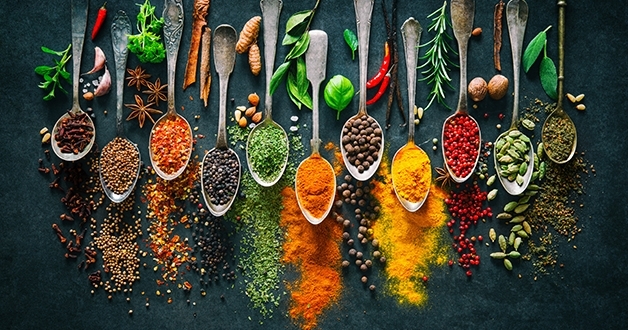
Learn to cook: the spices you need
0
1356
If you look at recipes cooked by the chefs, you will notice the abundance of spices they prepare.
It's inspiring when you see a pinch of it, two claws of that and a drop of "magic spice" enrich the taste and make the meal the star on the table.
Spices, besides being aromatic, are also rich in very valuable nutrients. Thus, against some negligible calories, we get valuable minerals, vitamins, and various phytonutrients.
Salt
What is a salt-free kitchen? It highlights the taste and is often self-sufficient.
Although it is necessary for our body, it should not be overstretched.
It's a good idea to use small amounts of salt (especially if you have salty foods in your menu), but combine them with fresh herbs for a better taste of the meal.
Limit refined salt, and instead load your cabinet with sea and Himalayan salt. Make sure their quality is good and there are no pollutants in the product.
Do not forget that sea salt contains a similar amount of sodium as it is in ordinary table salt - that is, it's more useful than it means that it can be generous.
Season the dish, put on a plate and keep the salt pan away when you sit down on the table. If you miss something in your taste, try adding fresh herbs and spices before you reach the salt-pan.
Black pepper grains
A pinch of black pepper is put in almost every dish and this is one of the most popular spices available throughout the year.
We should be glad that it is so accessible nowadays because it was so expensive in the Middle Ages that it was used as a currency.
The spice is obtained from the fruits of the Piper nigrum plant, which must be fermented, dried and uncured.
The white pepper is obtained from dried, then peeled ripe fruit.
If you want a saturated flavor, buy whole grains and grind them just before you taste the dish.
In 2 tablespoons whole pepper grains have 15 kcal and contain 37% of the daily dose of manganese, 11% of vitamin K and 9% of mineral honey.
Paprika
Red pepper is a well-known spice that is obtained by grinding or crushing dried red peppers (both sweet and chili).
Use in spaghetti sauce, on your pizza, in sauce chili or in various meat and vegetable dishes.
Red pepper releases its rich taste in heat treatment, but it should not be too hot because the taste becomes bitter.
Cinnamon
Cinnamon is a delicious spice, which also has a number of benefits to the body.
Cinnamon is a brown-reddish inner bark of cinnamon wood which, when dried, rolls into a roll (known as a cinnamon stick).
The cinnamon is available in the form of a stick as well as powdered.
Sticks can be stored for a longer time (1 year), but cinnamon powder tastes stronger (it lasts for about 6 months in a dark, dry and cool place enclosed in a glass container).
There are various varieties of cinnamon: Ceylon cinnamon, its Chinese variety of cassia, Vietnamese and Indonesian cinnamon. The highest quality is Ceylon Cinnamon ("true cinnamon").
There are many controversies about which cinnamon is more useful - cassia or Ceylon, but research is often controversial. The reason is that cinnamon contains cinnamon, but naturally occurring coumarins in Ceylon cinnamon are in much lesser quantities than those that could cause health problems.
In contrast, the cassia is known for its higher content of coumarin and could pose a risk to people who consume it in significant quantities on a regular basis.
If you are a passionate fan of cinnamon and consume it almost daily, you better choose Ceylon cinnamon and limit it to 1 tsp. daily. This will make sure you avoid the risk of unwanted intake of coumarin.
Cumin
Cumin is a spice with a rich history and is widely used in Indian and Mexican cuisine.
Select whole seeds instead of milled to keep your taste buds. If you have the opportunity, buy organically grown seeds.
Cumin is an excellent source of iron, a very good source of manganese and a good source of copper, calcium, magnesium, phosphorus, vitamin B1.
Two tablespoons of cumin seeds contain 16 calories and 16% of the daily iron dose.
Thyme
Thyme is a spice that has a strong aroma and will contribute to your success in the kitchen.
It is known from ancient times in culinary, aromatherapy and medicine.
In 2 tablespoons fresh thyme has only 5 calories but 10% of the daily dose of vitamin C.
Choose the fresh thyme to dry when possible, because you will have a better quality.
read more
Store the fresh thyme in the refrigerator packed in a paper bag.
Ginger
Ginger is an aromatic spice with a very specific taste and a number of health benefits. It is believed to be one of the major antioxidants in the world of plants.
Choose whole roots ginger to be dried and ground to powder, because in addition to more saturated flavor and flavor, you will get more health benefits.
Garlic
Garlic has a rich history, rich nutritional content and health benefits.
In 6 cloves of garlic, there are 27 calories, 15% of the daily dose of manganese, 13% of vitamin B6, 7% of vitamin C, 6% of honey.
Although garlic powder is easier to use, whole garlic heads have a more palatable taste and aroma, and you can get healthier health benefits when cooking with them. Keep them in a cool and dark place to keep their freshness as long as possible. You do not have to keep them in a refrigerator.
It is good that the garlic does not go over too high, and if you want to keep its health benefits optimally, do not expose it to heat treatment for a long time (5-15 minutes is the maximum allowed).
How to Store Dried Herbs and Spices
Do not store dried spices and herbs over the cooker or near another source of heat or moisture. Although they have been dried, they are heat sensitive, and when exposed to constant moisture, you increase the risk of fungal contamination.
Suitable containers for most spices are glass jars with tight closure caps.
You can not keep your spices forever - replace them at intervals depending on the spice. It's a good idea when you buy, take up for a maximum of two months - two ahead. This way you will be sure that in your cabinets you always have fresh spices.
Know their aromas so you can judge the difference between the old and the too old spices. If the rich and strong odor disappears, replace the spice with a new one.
Experiment each time and do not be afraid to try different options!.


